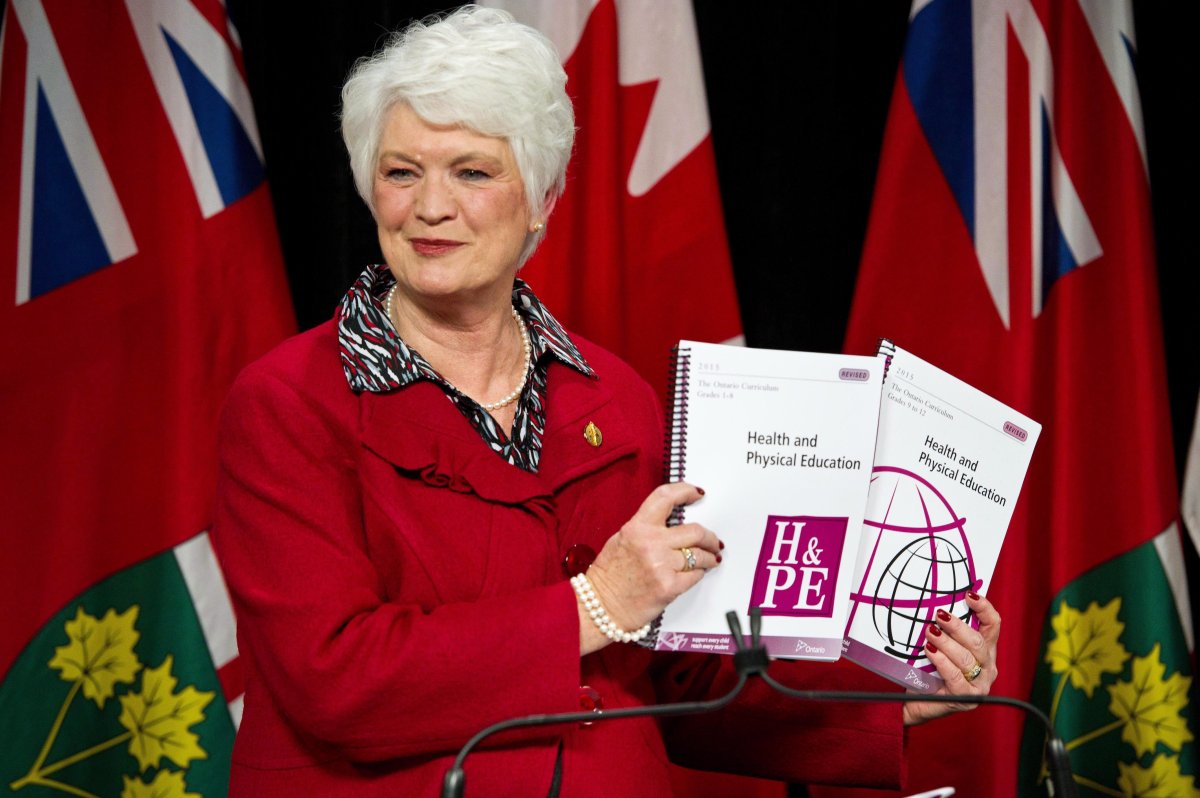Ontario’s updated sex ed curriculum has sparked debate around the role schools and teachers have in educating students about their sexual health.

Global News sought out the evidence behind sex ed so you don’t have to.
Why are schools teaching sex ed, anyway?
The Public Health Agency of Canada considers sexual health to be a vital component of public health, personal health and social welfare — one that “influences individuals across their lifespan.” And it’s important enough, on both an individual and societal level, to ensure it’s available to everyone.
Most Canadians become sexually active before age 20. “Since schools are the only formal educational institution to have meaningful (and mandatory) contact with nearly every
young person,” the Public Health Agency writes, “they are in a unique position to provide children, adolescents and young adults with the knowledge, understanding, skills and attitudes they will need to make and act upon decisions that promote sexual health throughout their lives.”
But isn’t primary school too young?
No. In fact, evidence indicates that making this a clear, safe, comfortable topic early on helps kids more.
“There are thousands of studies all over the world that show that the earlier you start the healthier the children are going to be, and the easier it is for them to make good informed decisions for themselves,” said Meg Hickling, a Vancouver-based nurse who has pioneered sex education for more than 25 years.
“Everything is age-appropriate,” said Vanessa Oliver, an assistant professor of Youth and Children’s studies at Wilfrid Laurier University.
“The truth is, starting in grade three they’re not learning about sex in terms of intercourse. Really at that age they’re thinking more in terms of family diversity, who makes up a family, that type of thing. It’s not getting into specifics into much later, in fact.”
At the same time, studies have shown that boys and girls are reaching puberty as young as eight.
Teenagers going through puberty will have a much healthier relationship with their body if they understand the changes they are going through before puberty starts.
What about the lessons on homosexuality?
The new curriculum introduces students to gender identity and sexual orientation in Grade 3.
Robb Travers, an associate professor of Health Sciences and Psychology at Wilfrid Laurier University and an expert on lesbian, gay, bisexual, transgendered and queer youth, says the update is badly needed – and there’s a huge benefit to teaching kids at an early age that different kinds of sexuality are healthy and normal.
“Children are remarkable in terms of compassion and understanding,” he said. “Most studies show that when kids are exposed to that kind of information at a young age, they don’t really have any problem accepting it.”
As with other aspects of the curriculum, it’s important students get healthy, accurate information to counter stereotypes they’re probably encountering already elsewhere.
“I’ve seen first-hand how the invisibility of accurate information for LGBT youth is a detriment to their health and well-being.”
Travers said, “There’s a very large body of scientific literature now that links the risk factors that face LGBT youth like suicide, school dropout, depression, anxiety, rejection from parents … to social marginalization and discrimination.”
Travers says that the updates to the curriculum provide students with accurate information on what it means to be gay.
“They’ll be taught the scientific understanding of their sexual orientation rather hearing misinformation that’s based on stereotype,” he said.
“That kind of information is based in science, and therefore belongs in school curricula.”
Put more simply, ensuring students learn about sexual and gender diversity early on makes schools safer and more inclusive places.
What’s with the inclusion of oral and anal sex, and masturbation?
Oral and anal sex are mentioned in the curriculum twice, both at the Grade 7 level.
The first refers to the importance of communication in relationship, including having a shared understanding with one’s partner about delaying sexual activity, including anal intercourse and “oral-genital contact”; and “the concept of consent and how consent is communicated.”
The second reference is in the context of preventing sexually transmitted infections.
The curriculum mentions masturbation once as a teacher prompt, which is an optional guide teachers can use while teaching a lesson focused on how students can build confidence “and lay a foundation for healthy relationships by acquiring a clearer understanding of the physical, social, and emotional changes that occur during adolescence (e.g., physical: voice changes, skin changes, body growth; social: changing social relationships, increasing influence of peers; emotional: increased intensity of feelings, new interest in relationships with boys or girls, confusion and questions about changes).”
(There’s also evidence these are questions some students are asking about already.)
Will schools teach my kid how to have sex or perform sex acts?
No. The idea behind much of what’s included is to both demystify sex and give students agency over their own bodies but also to ensure students know the risks of various sexual activities and how they can protect themselves.
But won’t talking about sex in school make my kids have sex super-early?
No. Studies dating as far back as the early 1980s have found good sexual education (that went beyond an abstinence-only model) postponed the age of first sexual activity, overall, increased the likelihood young people use contraceptives when they do have sex and reduced teen pregnancy.
But wasn’t this curriculum written by a man who was just convicted of horrific pedophilia offences? Has anyone had a good look at the material?
While there’s no question the crimes for which former Deputy Education Minister Ben Levin’s been convicted are awful, he can hardly be credited as the sole author of this curriculum.
Wilfrid Laurier University’s Oliver was one of many people consulted on Ontario’s new curriculum.
“I went through all of the curriculum documents and looked at what they had written five, almost six years ago, and basically told them the areas that I thought could use some updating,” she said.
There are also extensive evidence-based guidelines regarding what to include and how to structure sex education from the Sex Information and Educational Council of Canada.
“The ministry considered research, inter-jurisdictional benchmarking, and advice from academics and experts in many fields of study including mental health, public health, sexual health, physical education, and kinesiology,” Ontario Education Ministry spokesperson Gary Wheeler said in an email.
“In addition to the input received through further consultation with parents, completed near the end of 2014, the ministry also considered input from consultations with students, teachers, parents, faculties of education, universities and colleges, and other stakeholders. This included feedback we received from over 70 health related organizations that includes the Centre for Addiction and Mental health, the Ontario Public Health Association, and Ontario Healthy School Coalition.
“Current research and our extensive consultations indicated that the focus should be on providing factual and straight-forward information to students and de-stigmatizing concepts associated with sexuality.”
Can sex education be used to groom kids for sexual predation?
We’ve found no evidence of that; on the contrary, experts in pedophilia and sexual predators, as well as young people who’ve been victimized, have found young people who are more educated about sex and sexuality are less vulnerable – not more so.
Surveys of young people regarding their first sexual contact has also suggested that knowing more about consent, as well as the physical and emotional aspects of sex, would have given youth more control over their first sexual encounter.
Global News asked the anti-abortion Campaign Life Coalition, which has been quoted widely by sex ed opponents and which has emailed us about this issue specifically, if it could name any incidents where school-based sex education was used to groom students for pedophiles. We were told this question “misses the point entirely.”
But these topics are pretty radical, right?
Not really.
Almost all of them are included, many at much younger ages, in other Canadian provinces and U.S. jurisdictions.
READ MORE: Sex education compared across Canada
Isn’t this something that should be up to parents?
As kids’ first educators and authority figures, it’s obviously great if parents talk to their kids about this at home.
But not all parents feel comfortable or are familiar with what their kids may be encountering.
“When we look at the research, we see that more than 70% of Canadian parents have said that they would rather their kids learn sex ed in school than sex ed at home,” said Oliver.
And school definitely is better than other places kids are educating themselves about sex. Oliver pointed to the Toronto Teen Survey that found teens were receiving sexual information from potentially unreliable sources such as the internet and friends.
And educating parents, Hickling notes, is also an important part of this curriculum.
“Parents for the most part have never seen good sexual health education and they’re also very naive when certain topics should be introduced to children,” she said.
Fair enough. But I already talk to my kids about sex all the time. They know the anatomical terms for genitalia, my kid’s best friend has two mommies and we spend mealtimes discussing the gender constructs we’ve encountered that day. We have the definition of consent stitched into a sampler in the den. I’m confident we could have frank discussions about whatever weird stuff my daughter’s friend’s older brother says he saw on the Internet. Do I really need to make my kid sit through sex ed in school?
No – you can opt out if you want.
Each school may deal with this differently, so check with your child’s teacher or administrators.
“Anytime a parent has a question or concern about the learning in their child’s class, they should raise the concern with the teacher or the school principal so that a discussion can take place to clarify their concern and to provide information about the curriculum content. A determination can be made on a case by case basis to come to a resolution, taking into account board policies and individual circumstances,” Ontario Education Ministry spokesperson Gary Wheeler said in an email.
Still have concerns? Go for it: Read the curriculum yourself. (If you’re expecting something sexy, we guarantee you will be disappointed.)
Hickling says once parents receive that sexual health education themselves, the curriculum will be much less contentious.
“Parents consistently underestimate children’s ability to be mature on this topic. And once we begin to explain what we’re all about, we’ve got the parents,” she said.
“Almost never did a parent object once they’d heard the parent presentation and had the parent education.”



Comments